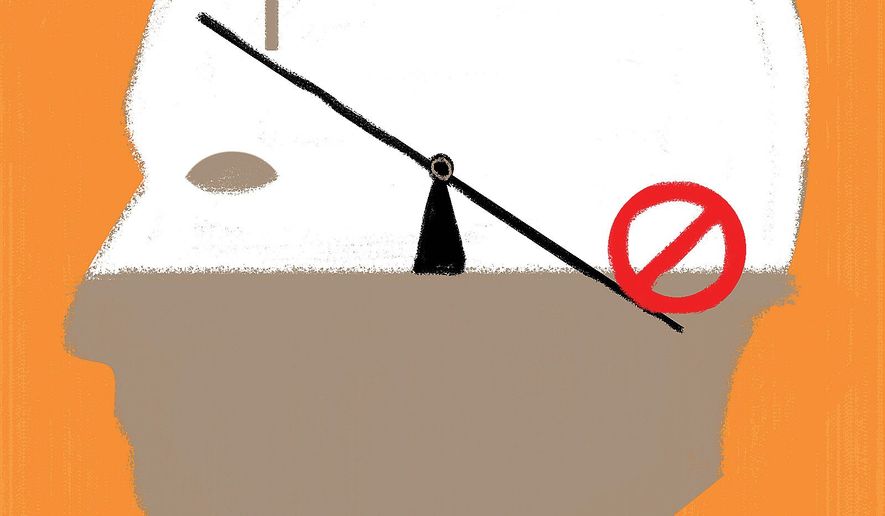OPINION:
Seven justices of the U.S. Supreme Court recently agreed that the Colorado Civil Rights Commission was unconstitutionally biased against the religious beliefs of Jack Phillips, the owner of Masterpiece Cakeshop.
This holding is a win for all Americans who believe that they have a right to the fair administration of the law, without hostility toward their religious beliefs and without being the victim of a legal double standard.
According to the court, the commission showed its anti-religious bias against Mr. Phillips in at least two ways. First, one commissioner — supposedly a neutral, unbiased judge in the case — made multiple comments disparaging Mr. Phillips’ religious beliefs.
Justice Kennedy was specifically critical of statements by one of the members of the Colorado Civil Rights Commission. During one public meeting, the commissioner implied Mr. Phillips was “us[ing] his religion” to hurt others, stating that “[f]reedom of religion has been used to justify all kinds of discrimination” and that it is “one of the most despicable pieces of rhetoric that people can use.”
In his majority opinion for the Supreme Court, Justice Kennedy noted his disappointment in the lack of neutrality and respect employed by the commissioner. “To describe a man’s faith as ’despicable,’” said Justice Kennedy, “is to disparage his religion in at least two distinct ways: by describing it as despicable, and also by characterizing it as merely rhetorical — something insubstantial and even insincere.”
Rightly, Justice Kennedy concluded, “This sentiment is inappropriate for a commission charged with the solemn responsibility of fair and neutral enforcement of Colorado’s antidiscrimination law.”
Not only did the court find that the commission lacked neutrality and respect, Justice Kennedy observed that, by using a clear double standard that stacked the deck against religious believers, the commission was guilty of religious hostility in violation of the Free Exercise clause. On three separate occasions, the commission concluded that other bakers have a right not to create cakes with religious messages that the bakers found offensive, but Mr. Phillips did not have the same right to not create a cake with a message that violates Mr. Phillips’ religious beliefs.
The decision has clear implications for Aaron and Melissa Klein, owners of a bakery in Oregon who suffered an egregious $135,000 damages penalty for declining to bake a custom cake for a same-sex wedding and whose family bakery has since had to close its doors. My firm, First Liberty Institute, represents the Kleins and is currently seeking review before the Supreme Court of Oregon. The case could one day reach the U.S. Supreme Court.
The similarities between the Phillips and Klein cases are striking. Before even hearing the case, an Oregon government official, Brad Avakian, who was supposed to be a neutral arbiter, made public comments showing his bias against the Kleins.
For instance, in an article about the Kleins, he was quoted as saying, “Everyone is entitled to their own beliefs, but that doesn’t mean that folks have the right to discriminate,” supposedly speaking generally. In the same article, he also stated that his “goal is to rehabilitate.” Implying that people with disfavored religious beliefs need to be rehabilitated is a clear demonstration of anti-religious bias. If Mr. Avakian’s statements themselves don’t demonstrate his anti-religious bias, the fact that he made them before the Kleins even had their day in court should make it crystal clear.
Then, in his official decision, the commissioner accepted that the Kleins acted based on their religious beliefs, but nevertheless equated the Kleins’ denial to create a custom cake with “bigotry” and a “clear and direct statement that [the couple] lacked an identity worthy of being respected.”
Accusations of bigotry and ulterior motives are precisely the opposite of the “neutral and respectful consideration” of religious beliefs required by the Masterpiece opinion.
And, if that is not enough, it is simply outrageous to award $135,000 in damages for causing offense. The sheer magnitude of the damages penalty for declining to create a custom cake and quoting a Bible verse is clear evidence of the type of anti-religious bias seven justices of the U.S. Supreme Court declared unlawful.
In short, the Oregon decision against the Kleins was polluted by the same anti-religious bias that caused the U.S. Supreme Court to rule for Masterpiece Cakeshop on Free Exercise grounds. The Kleins and all Americans deserve the same protection from government anti-religious hostility that the Supreme Court afforded Jack Phillips.
• Stephanie Taub is senior counsel to First Liberty Institute, FirstLiberty.org.




Please read our comment policy before commenting.